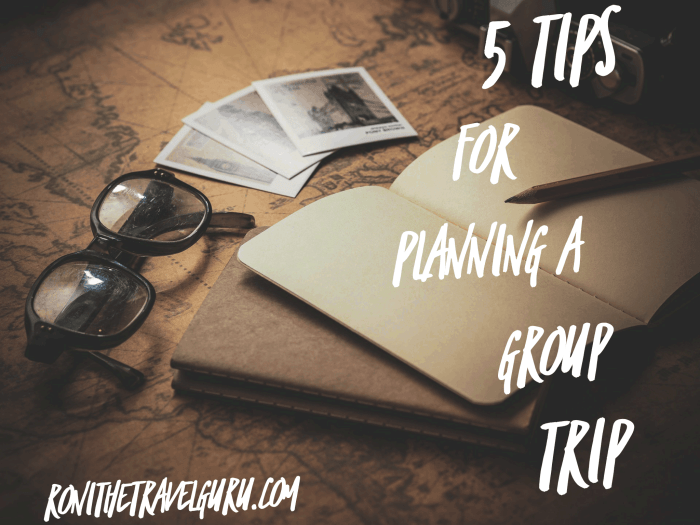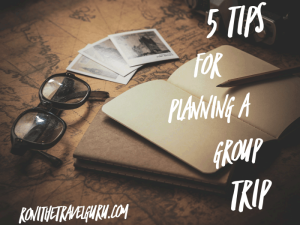
Embark on a journey of discovery as we delve into the art of organizing group travel trips, offering invaluable insights and practical advice to make your next group adventure a resounding success.
From meticulous planning to fostering group dynamics, this guide covers all aspects necessary for a seamless and unforgettable group travel experience.
Introduction to Group Travel
Group travel refers to the act of traveling with a group of people, whether it be friends, family, or organized tours. It offers a unique way to explore new destinations and create lasting memories with others.
Planning and organization are crucial aspects of group trips to ensure a smooth and enjoyable experience for all participants. From coordinating transportation and accommodations to creating an itinerary that caters to everyone’s interests, careful planning is key.
The Advantages of Traveling in a Group
- Shared experiences: Traveling with a group allows you to share moments and create memories together, enhancing the overall travel experience.
- Cost-effective: Group travel often leads to discounted rates for accommodations, transportation, and activities, making it a more budget-friendly option.
- Safety in numbers: Having a group provides a sense of security and support, especially in unfamiliar places or challenging situations.
- Access to group discounts: Many attractions and tours offer special rates for groups, providing additional savings opportunities.
- Opportunity for social interaction: Group travel allows you to meet new people, make friends, and foster connections that can last beyond the trip.
Planning a Group Travel Trip
When organizing a group travel trip, it is crucial to plan meticulously to ensure a smooth and enjoyable experience for all participants. Here is a step-by-step guide on how to plan a group travel trip effectively.
Designating a Trip Leader
- Choose a responsible and organized individual to be the trip leader.
- The trip leader should have good communication skills and be able to handle any issues that may arise during the trip.
- Clearly define the roles and responsibilities of the trip leader to ensure coordination and efficiency.
Choosing Destinations Suitable for Group Travel
- Consider the interests and preferences of the group members when selecting a destination.
- Opt for destinations that offer a variety of activities to cater to different tastes within the group.
- Ensure the destination is easily accessible and has accommodation options suitable for groups.
- Research the safety and security of the destination to ensure a worry-free trip for all participants.
Setting a Budget for Group Travel
Planning a group travel trip involves careful consideration of the budget to ensure everyone can participate without financial strain. Here are some tips on how to set a budget for a group travel trip, discuss cost-sharing options among group members, and provide ways to save money during the planning process.
Creating a Budget
Creating a budget for a group travel trip starts with determining the total cost of the trip, including transportation, accommodation, meals, activities, and any other expenses. Once the total cost is calculated, divide it by the number of participants to determine the individual contribution required. It is essential to consider everyone’s financial situation and set a budget that is affordable for all group members.
Cost-Sharing Options
- Split Costs Equally: One common approach is for each group member to contribute an equal amount towards the total cost of the trip. This method ensures fairness and simplicity in budgeting.
- Allocate Costs Based on Preferences: Another option is to assign specific expenses to each group member based on their preferences. For example, those who prefer a private room may contribute more towards accommodation expenses.
- Use Apps for Expense Tracking: Utilize apps or online tools to track expenses and ensure transparency in cost-sharing among group members.
Tips to Save Money
- Book Early: Secure early bird discounts on transportation and accommodation by booking in advance.
- Opt for Group Discounts: Take advantage of group discounts offered by airlines, hotels, and tour operators for a cost-effective travel experience.
- Prepare Shared Meals: Save money on food expenses by preparing shared meals or opting for budget-friendly dining options.
- Plan Free Activities: Incorporate free or low-cost activities into the itinerary to balance out expenses and enjoy a diverse travel experience without breaking the bank.
Accommodation and Transportation

When organizing a group travel trip, selecting suitable accommodation and coordinating transportation are crucial aspects to consider to ensure a smooth and enjoyable experience for all participants.
Choosing Accommodation
When choosing accommodation for a group, consider factors such as location, amenities, room configurations, and group size. Opt for hotels or rental properties that offer group-friendly options like connecting rooms or large common areas. Make sure the accommodation is centrally located to easily access attractions and restaurants.
- Look for group discounts or deals offered by hotels for booking multiple rooms.
- Consider renting a vacation home or apartment for a more communal experience.
- Check reviews and ratings of accommodations to ensure quality and comfort for the group.
Transportation Options
There are various transportation options available for group travel, including charter buses, trains, rental vans, or even carpooling. Consider the distance to be traveled, group size, and budget when selecting the transportation mode.
- Charter buses are ideal for larger groups and offer comfort and convenience for long journeys.
- Rental vans or cars can provide flexibility and freedom to explore different locations at your own pace.
- Trains are a great option for group travel within cities or countries with extensive rail networks.
Coordinating Logistics
Once you have selected accommodation and transportation, it is essential to coordinate logistics effectively to ensure a seamless travel experience for the group. Make sure to communicate pickup/drop-off times, meeting points, and any itinerary changes clearly to all participants.
- Create a detailed itinerary with transportation schedules, accommodation details, and contact information for all participants.
- Assign responsibilities to group members for tasks like handling luggage, checking in/out of accommodations, or coordinating transportation.
- Stay in touch with transportation providers and accommodation staff to address any issues or changes promptly.
Activities and Itinerary Planning
When planning a group travel trip, it is essential to consider the activities and create a well-balanced itinerary that caters to the interests of all group members. Flexibility in the itinerary is crucial to accommodate unexpected changes and ensure everyone has a memorable experience.
Ideas for Group Activities
- City tours to explore local landmarks and culture
- Outdoor adventures like hiking, biking, or water sports
- Culinary experiences such as food tours or cooking classes
- Team-building activities like escape rooms or group challenges
- Relaxation days at spas or beaches
Creating a Balanced Itinerary
- Include a mix of sightseeing, leisure time, and group activities
- Factor in rest days to avoid burnout and allow for spontaneity
- Allocate free time for individuals to explore personal interests
Catering to Different Interests
- Survey group members in advance to determine preferences
- Offer optional activities to accommodate varying interests
- Rotate leadership for activity planning to ensure diversity
Communication and Group Dynamics
Effective communication is crucial for the success of any group travel trip. It helps in coordinating activities, resolving conflicts, and building a sense of camaraderie among group members.
Tips for Effective Communication
- Establish a group chat or communication platform to keep everyone informed about the trip details, itinerary changes, and important updates.
- Encourage open and honest communication among group members to address any concerns or preferences before they escalate into conflicts.
- Assign a communication coordinator within the group to ensure that important messages are relayed to everyone in a timely manner.
- Use active listening techniques to ensure that everyone feels heard and understood during group discussions or decision-making processes.
Handling Conflicts or Disagreements
- Address conflicts calmly and respectfully, focusing on finding a mutually beneficial solution rather than escalating the situation.
- Encourage group members to express their viewpoints and concerns openly, and work towards finding common ground through compromise or negotiation.
- Seek mediation from a neutral party within the group or outside help if conflicts cannot be resolved internally.
- Remind the group of the common goal of enjoying the trip together and encourage a positive and cooperative mindset to overcome disagreements.
Fostering Teamwork and Camaraderie
- Organize team-building activities or group challenges to encourage collaboration and bonding among group members.
- Celebrate milestones or achievements during the trip to boost morale and create a sense of unity within the group.
- Encourage sharing experiences and creating memories together to strengthen the bond among group members.
- Lead by example by demonstrating teamwork, respect, and appreciation for each member’s contributions to the group.
Cultural Tourism

Cultural tourism plays a significant role in group travel by providing participants with the opportunity to immerse themselves in the local traditions, history, and way of life of a destination. It adds a unique and enriching dimension to the travel experience, allowing travelers to broaden their horizons and gain a deeper understanding of different cultures.
Cultural Experiences to Include in Group Trips
- Visiting historical sites and monuments to learn about the local history and heritage.
- Attending traditional cultural performances such as dance, music, and theater shows.
- Participating in cooking classes to learn about the local cuisine and culinary traditions.
- Exploring local markets and handicrafts to support local artisans and learn about traditional crafts.
- Engaging with local communities through homestays or cultural exchange programs.
Respecting and Engaging with Local Culture
When engaging in cultural tourism during group travels, it is essential to show respect for the local customs and traditions. This can be done by:
- Learning about the cultural norms and practices of the destination before the trip.
- Being mindful of dress codes and behavior to avoid unintentional offense.
- Supporting local businesses and artisans to contribute positively to the local economy.
- Participating in cultural activities with an open mind and willingness to learn from the local community.
- Engaging with locals in a respectful and friendly manner, showing appreciation for their culture.
Eco-Tourism
Ecotourism is a sustainable form of travel that focuses on conserving the environment, supporting local communities, and preserving natural resources. It emphasizes responsible travel practices that minimize the negative impact on the environment and promote cultural awareness and conservation efforts.
Principles of Eco-Tourism
- Respect local cultures and traditions
- Minimize environmental impact
- Support conservation efforts
- Provide economic benefits to local communities
Minimizing Environmental Impact
When organizing a group travel trip with an eco-friendly focus, consider the following tips:
- Choose accommodations with green certifications
- Reduce waste by using reusable water bottles and bags
- Opt for eco-friendly transportation options like public transit or walking
- Offset carbon emissions by supporting environmental projects
Eco-Friendly Activities and Destinations
There are many eco-friendly activities and destinations suitable for group eco-tourism, such as:
- Volunteering at local conservation projects
- Hiking in national parks or nature reserves
- Visiting sustainable farms or eco-lodges
- Participating in beach clean-ups or wildlife monitoring programs
Culinary Travel
Exploring local cuisines and dining options plays a crucial role in enhancing the overall travel experience for a group. It allows travelers to immerse themselves in the culture of a destination through its food, creating memorable moments and forming deeper connections with the local community.
Tips for Exploring Local Cuisines and Dining Options
- Research local restaurants and food markets in advance to find authentic dining experiences.
- Ask locals or hotel staff for recommendations on must-try dishes and eateries.
- Consider participating in cooking classes or food tours to learn about the traditional culinary practices of the region.
- Be open to trying new foods and flavors, even if they are unfamiliar.
Incorporating Culinary Experiences into the Itinerary
- Include visits to local markets, street food stalls, and restaurants known for their regional specialties.
- Plan group meals at restaurants that offer a variety of dishes to cater to different tastes and dietary preferences.
- Organize a food-themed walking tour or tasting session to introduce the group to the diverse flavors of the destination.
- Encourage group members to share their favorite food experiences and dishes with the rest of the group.
Historical Travel
Exploring historical sites and landmarks during group travel offers a unique opportunity to delve into the past and gain a deeper understanding of different cultures and civilizations. It allows travelers to connect with history in a more meaningful way and creates lasting memories that can be cherished for years to come.
Planning Visits to Historical Sites
When planning visits to historical sites as a group, it is essential to research and select sites that align with the group’s interests and preferences. Consider the historical significance, cultural relevance, and educational value of each site to ensure a well-rounded experience for all travelers. It is also important to coordinate with local guides or experts who can provide insightful information and enhance the overall learning experience.
Benefits of Learning History Together
- Gain a deeper appreciation for different cultures and traditions.
- Foster a sense of camaraderie and shared learning among group members.
- Enhance critical thinking and analytical skills by exploring historical events and their impact on society.
- Create lasting memories and strengthen bonds through shared experiences.
- Develop a broader perspective on global history and its relevance to contemporary issues.
Luxury Travel
Luxury group travel experiences offer a heightened level of comfort, exclusivity, and personalized service. When planning a luxury group trip, it is essential to consider various factors to ensure a seamless and unforgettable journey for all participants.
Selecting Luxury Accommodations and Experiences
When choosing luxury accommodations for a group, prioritize properties that offer spacious suites or villas, upscale amenities, exceptional service, and unique experiences. Look for properties with exclusive access to private beaches, spas, fine dining restaurants, and personalized concierge services.
For luxury experiences, opt for private tours, VIP access to attractions, gourmet dining experiences, and bespoke activities tailored to the group’s interests. Consider adding special touches such as butler service, private transfers, and exclusive events to enhance the overall luxury experience.
Creating a Luxurious Itinerary
When crafting a luxurious itinerary for a group trip, focus on curated experiences that showcase the destination’s finest offerings. Include visits to iconic landmarks, upscale shopping districts, renowned restaurants, and exclusive cultural performances.
Integrate leisurely activities such as spa days, yacht cruises, wine tastings, and private cooking classes to add a touch of luxury and relaxation to the itinerary. Ensure that the schedule allows for ample free time for group members to indulge in personalized experiences or simply unwind at their leisure.
Budget Travel
Planning a budget-friendly group travel trip requires careful consideration of cost-saving strategies for accommodations, transportation, and activities. By being mindful of expenses, group travelers can enjoy a memorable trip without breaking the bank.
Cost-Saving Strategies
- Choose budget-friendly accommodations such as hostels, guesthouses, or vacation rentals instead of luxury hotels. Consider options that offer group discounts or package deals.
- Opt for public transportation or carpooling to save on transportation costs. Research group rates for tours or attractions to get the best deals.
- Look for free or low-cost activities such as hiking, visiting local markets, or exploring parks and museums. Avoid expensive tourist traps and focus on authentic experiences.
Benefits of Budget Travel
- Allows group travelers to experience more destinations within a limited budget.
- Promotes a sense of camaraderie and teamwork as travelers collaborate to find affordable options.
- Encourages exploration off the beaten path and discovery of hidden gems in a destination.
Backpacking
Backpacking is a popular way to explore the world on a budget, and organizing a backpacking trip for a group can be a rewarding experience. It requires careful planning, efficient packing, and a focus on safety and logistics.
Essentials of Organizing a Backpacking Trip for a Group
- Choose a destination that is suitable for backpacking and group travel.
- Create a detailed itinerary with input from all group members.
- Assign roles and responsibilities within the group for tasks like cooking, navigation, and first aid.
- Ensure everyone has the necessary gear and equipment for the trip.
Tips on Packing Efficiently and Light for Group Backpacking
- Pack multi-purpose clothing and gear to save space in your backpack.
- Share communal items like cooking utensils and toiletries to reduce individual loads.
- Choose lightweight and compact items to minimize weight without sacrificing essentials.
- Consider the weather and terrain of your destination when packing clothing and gear.
Safety Considerations and Logistics for Group Backpacking
- Establish emergency protocols and communication methods within the group.
- Carry a first aid kit and know how to use it in case of injuries or illnesses.
- Stay together as a group while hiking or exploring to avoid getting separated.
- Research local regulations and customs to ensure a smooth and safe backpacking experience.
Solo Travel
Solo travel offers a unique experience that differs from group travel in many ways. It allows individuals to explore destinations at their own pace, make spontaneous decisions, and immerse themselves fully in the local culture. However, there are both benefits and challenges to solo travel compared to traveling in a group.
Benefits of Solo Travel
- Solo travelers have the freedom to create their own itinerary and make decisions based on personal preferences.
- Opportunities for self-discovery and personal growth through facing challenges independently.
- Fosters a sense of empowerment and self-reliance as travelers navigate unfamiliar territories on their own.
Challenges of Solo Travel
- Loneliness and lack of companionship can be a downside of solo travel, especially during meals or downtime.
- Security concerns may arise, as solo travelers can be more vulnerable to theft or scams without the safety net of a group.
- Higher costs for accommodation and transportation, as solo travelers do not benefit from group discounts.
Tips for Joining Group Trips as a Solo Traveler
- Research group travel companies or tours that cater to solo travelers, offering the chance to join a group of like-minded individuals.
- Attend meet-up events or online forums to connect with other solo travelers looking to join group trips.
- Consider booking day tours or activities at your destination to meet other travelers and potentially join them for part of their journey.
Group Travel
Group travel offers a unique opportunity for individuals to explore new destinations, create lasting memories, and form strong bonds with fellow travelers. The social experiences and shared adventures that come with group travel can enhance the overall trip experience and leave a lasting impact on participants.
Advantages of Group Travel for Social Experiences and Shared Memories
- Group travel allows individuals to connect with like-minded people who share a passion for exploring new places.
- Traveling in a group provides a sense of security and companionship, especially in unfamiliar or foreign environments.
- Group dynamics can lead to new friendships, collaborations, and a sense of community among travelers.
- Shared experiences and memories created during group travel can strengthen relationships and create a sense of camaraderie.
Memorable Group Travel Experiences
- During a group trip to a remote village, participants had the opportunity to immerse themselves in the local culture, interact with the community, and participate in traditional ceremonies.
- On a group hiking expedition, travelers conquered challenging trails together, supported each other through difficult terrain, and celebrated their achievements at the summit.
- During a group culinary tour, participants learned to cook traditional dishes, tasted local delicacies, and bonded over shared meals and cooking experiences.
Tips for Making the Most of Group Travel Opportunities
- Be open-minded and willing to engage with fellow travelers to maximize social interactions and cultural exchange.
- Participate in group activities, excursions, and team-building exercises to strengthen bonds and create shared memories.
- Communicate openly and respectfully with group members to address any conflicts or concerns that may arise during the trip.
- Embrace the diversity of perspectives and backgrounds within the group to enhance the overall travel experience and foster mutual understanding.
Final Summary
In closing, mastering the art of organizing a group travel trip opens doors to endless possibilities, forging bonds through shared experiences and creating lasting memories that transcend time and place. Let the journey begin!
Frequently Asked Questions
How do I handle conflicts within a group during a trip?
Address conflicts calmly and openly, encourage dialogue, and seek compromises that benefit the entire group.
Is it necessary to designate a trip leader for a group travel trip?
Having a designated trip leader ensures clear communication, decision-making, and coordination throughout the trip.
What are some cost-sharing options for group travel?
Options include splitting accommodation costs evenly, sharing transportation expenses, and organizing group activities to reduce individual expenses.





